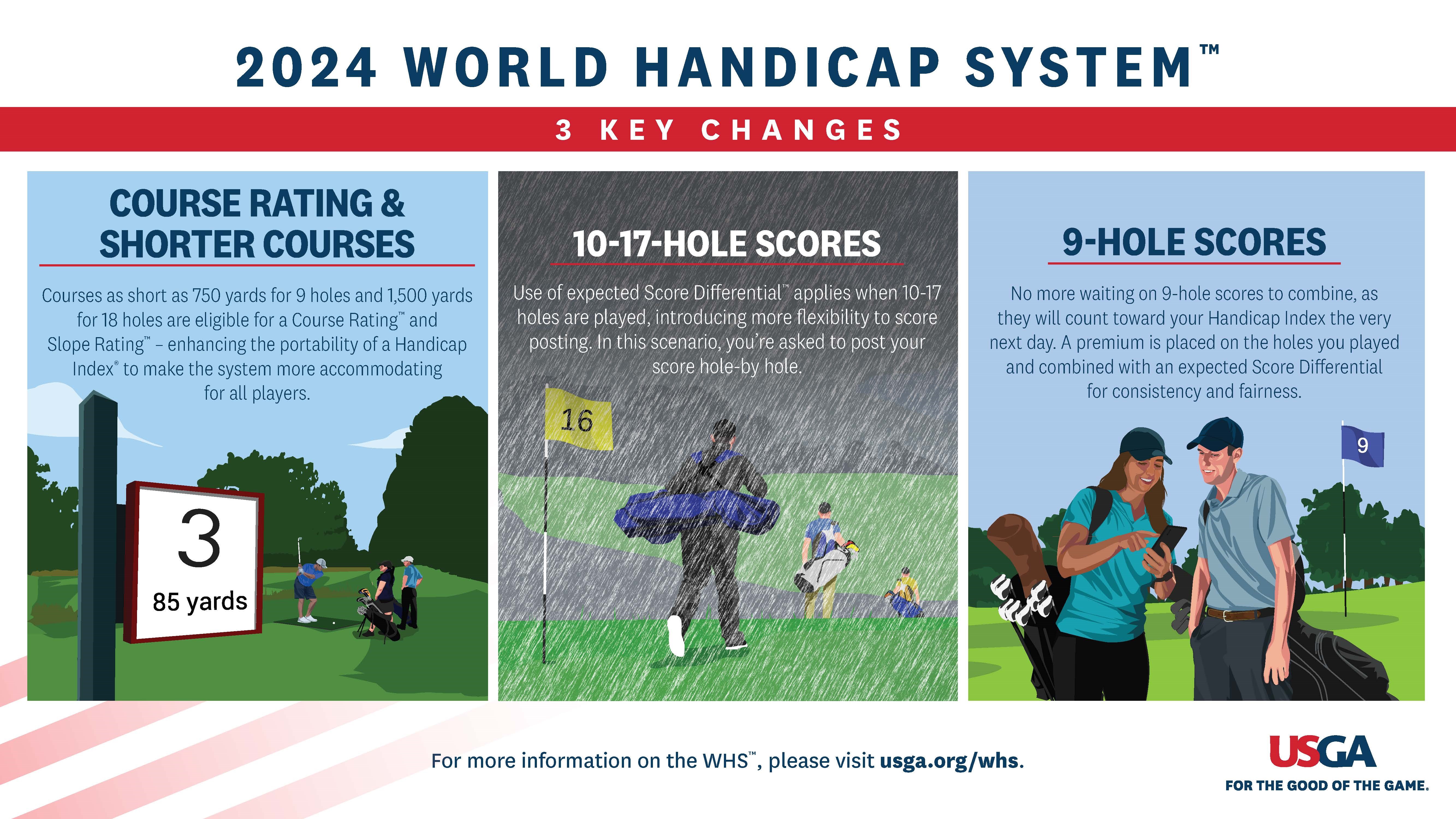
World Handicap System Changes Coming in 2024!
To Read the Release from the USGA on the WHS Changes, CLICK HERE.
The World Handicap System (WHS) was introduced in 2020 to create a uniform system around the globe. It has brought together six different handicap systems that were used around the world into one unified system. Just as the USGA in partnership with the R&A (Royal & Ancient Golf Club) reevaluates and revises the rules of golf every four years to determine any necessary changes, they are now doing the same with the World Handicap System. The goal in each of these cases is to improve the game and keep it consistent and up to date with the modern players from around the world. Changes coming in 2024 to the WHS aim to make Handicapping more accessible and accurate for all.
There are 3 Key Changes being made: integrating shorter length courses, introducing a responsive approach to 9-hole scores, and providing more score-posting flexibility. So what does this mean?
Integrating Shorter Length Courses. As it stands right now, courses under 3,000 yards for 18-holes and 1,500 yards for 9-holes can not be given a Course or Slope Rating under the Course Rating and Handicap Systems. In the new year, these yardages will drop by half. Courses as short as 750 yards for 9-holes and 1,500 yards for 18-holes will be eligible for Course and Slope Ratings. This will help enhance the portability and accessibility of Handicap Indexes, so that the system is more accommodating to all players.
Introducing a Responsive Approach to 9-hole Scores. Currently, when a player posts a 9-hole score, it is not immediately calculated into a player’s handicap index unless it is able to be paired with another 9-hole score. Essentially, without a total of 18 holes, the scores do not get factored into the handicap index calculation. This will be no more. With the new changes, 9-hole scores do not need to wait to be combined and will count towards your Handicap Index the next day. How is this possible? A premium will be placed on the 9 holes you did play, and will then be combined with an expected Score Differential for consistency and fairness.
Providing More Score-Posting Flexibility. Before changes are made, a player must play at least 14 holes to post an acceptable 18-hole score to GHIN. As we ring in these changes in the new year, this too will be altered. Using Expected Score Differential, scores can be posted when 10-17 holes are played. The expected score differential will calculate a player’s likely score, rather than using a score of net par. This will provide more flexibility to golfers when posting. But, there are some key factors to this to note: you must post your score using the hole-by-hole input feature. You must also remember that there still must be a valid reason for the non-completion of the round, i.e. darkness, unplayable weather conditions, injury, etc.
The teams at the USGA and R&A are continually striving to better the World Handicap System, so that no matter where you play, you can have the most accurate measure of your demonstrated playing ability. As the WHS continues to mature, the teams will be able to gather more and more data and information that will provide insight into areas that may need improving. Bear in mind that this specific system is only closing out its third year of governance around the globe, and that the game continues to grow and evolve. The USGA and R&A are striving to make necessary and beneficial improvements to the game that will make it more accessible, flexible, accurate, and inclusive to all players of all abilities from all countries on all courses. That is why in regular intervals, the two bodies go through a review process of all aspects of the game, so that you and everyone can have a better understanding of the game and a better golf experience.
Access our WHS Changes Hub to learn more about the changes coming. As we gain resources to help further the understanding and implementation of these changes, we will add them to the Hub.
Have more questions about the World Handicap System?
Visit the WHS page.
